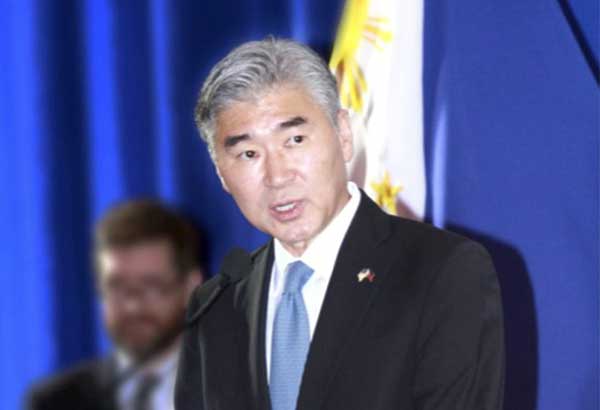US pledges P730 million for Marawi recovery

Ambassador Kim
Three months after fighting broke out in Marawi City following the attack by an extremist terrorist group, government troops seem to be finally gaining the upper hand with the takeover of a strategic bridge and the battle contained within a 500-square meter area. Focus is now on recovery and rehabilitation, with displaced residents (78,466 families, according to estimates by the Department of Social Welfare and Development) taking small steps to return to their “normal lives” as seen, for instance, in the reopening of 12 public elementary schools the other day. A contingent of over 100 all-female police and military personnel is also being deployed to help in the rehabilitation of the capital of Lanao del Sur.
The rehabilitation of Marawi will definitely require massive effort and funding, with Defense Secretary Delfin Lorenzana estimating at least P50 billion will be needed to “cover everything” from roads to bridges, as well as public and private structures. According to Socioeconomic Planning Secretary and National Economic and Development Authority chief Ernie Pernia, the Asian Development Bank and the World Bank will be “lead coordinators” for foreign donors who will help in the rehabilitation efforts.
Foreign governments have also pledged their support, among them the country’s longtime ally the United States, which has committed P730 million, or over $14 million through the US Agency for International Development (USAID) in emergency relief and recovery assistance for the affected communities.
Reiterating his country’s continued support for the Philippine government’s efforts to deal with the crisis in Marawi City, US Ambassador Sung Kim said, “The United States is deeply committed to this relationship and remains ready to support our friend and ally as we face the challenges and opportunities,” adding that everyone is looking forward to the end of the crisis and the end of the fighting and suffering.
The US will coordinate with the government and humanitarian organizations in delivering critical relief supplies for the displaced residents such as safe drinking water, hygiene kits, shelter materials and even kitchen sets to help improve conditions in evacuation centers and other temporary housing. Earlier in July, the US distributed 12,000 water containers and 100,000 chlorine tablets for the 12,000 families staying in evacuation sites located in Lanao del Norte, Lanao del Sur and Iligan City.
As usual in cramped quarters, all kinds of diseases could quickly spread, with babies and young children among the most vulnerable, which is why the USAID is also providing 18 facilities that would help address health issues such as tuberculosis, as well as maternal, newborn and child health needs. Aside from helping restore basic public services such as healthcare, water and electricity, the US is focused on long-term rehabilitation and recovery efforts by providing psychosocial counseling and offering skills training for young people, promoting community dialogue and jumpstarting livelihoods.
MOPC welcomes ‘invite’ for media to cover anti-drug operations
The Manila Overseas Press Club (MOPC), through its chairman Antonio “Tony” Lopez, welcomed the order issued by President Duterte to allow members of the media to cover the anti-illegal drug operations of the Philippine National Police as it would promote transparency during such police operations. The President had instructed the PNP to “bring the media and let them go first so they can get the story from the beginning to the end,” seeking to dispel allegations of extra-judicial killings in the government’s crackdown on illegal drugs.
Much earlier, the President debunked accusations that the administration has made it an official policy to kill drug offenders, as criticism mounted over the killing of 19-year-old Carl Angelo Arnaiz and 17-year-old Kian delos Santos.
There is no question, however, that the problem of illegal drugs has become so deep and widespread, especially with illegal drug traffickers making use of the country’s porous borders to smuggle prohibited substances. A case in point is the P6.4 billion shabu (methamphetamine hydrochloride) shipment from China that slipped through the Bureau of Customs (BOC).
At the last Senate hearing, Senator Richard Gordon blamed China for the proliferation of illegal drugs, saying it is “shabulizing” the country, with 60 percent of the drugs coming in the Philippines sent by people of Chinese descent. Much earlier, US Ambassador Kim also urged China to take stronger legal action to stop the shipment of dangerous items used in the production of shabu, stressing that it would be the right thing to do. “My understanding is that most of the precursors that go into (manufacturing) shabu come from China,” the US diplomat said.
Trafficking in illegal drugs has become such a lucrative business, with a report from Global Financial Integrity – a Washington-based organization that conducts research on illicit financial flows – that the estimated market on drug trafficking has an annual global value estimated at $652 billion – although no one would be surprised if the figures are actually higher because the “operations and transactions are covert.” The GFI report also reiterated that production and trafficking of “amphetamine-type stimulants” and the so-called “new psychoactive substances” thrive in regions with “porous borders and/or weak controls on precursor chemicals.”
* * *
Email: [email protected]
- Latest
- Trending





























